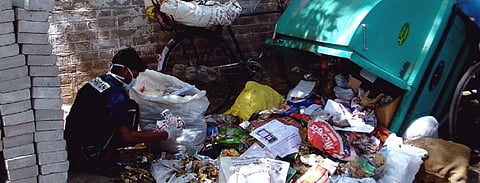COVID-19: India’s circular economy faces a rough ride
India’s performance in the circular economy till a few months ago was outstanding. It was leading in collection and recycling of PET plastic waste — collecting 60 per cent of its total PET consumption and recycling it too. The scenario, however, changed due to novel coronavirus disease (COVID-19) pandemic.
The environment is finally breathing under the lockdown. The air quality index (AQI) of cities is improving and there has been a drop in particulate matter (PM) 2.5, as well as concentraion of NOx, SOx, CO, and CO2 in the air.
The Biological Oxygen Demand levels of rivers has increased. They are also cleaner now.
The waste management sector, however, may be in for a rough ride in the coming days. For the last 10-15 years, some tremendous work has been done on circular economy. The Union government recently introduced a policy to strengthen collection, segregation and recycling of plastic waste.
Before COVID-19 threw the world into a healthcare and economic mess, entrepreneurs undertook waste management as a career opportunity and invested knowledge, time and money to make the sector more sustainable and profitable. Things were getting streamlined, but then, COVID-19 was declared a pandemic. Following this, India announced a nationwide lockdown for 21 days, which was further extended to another 19 days.
Since April 20, many waste management agencies, including those working on the ground, halted their services.
Now, only municipalities are collecting waste but at different frequencies. At some places, the waste is being collected on alternate days, whereas at others, only once a week. There is no secondary segregation and resource recovery. Waste that is collected by the municipalities is being disposed of either in landfills or dumping yards.
There is no secondary segregation because workers are fearsome of getting infection by the SARS-CoV-2 virus. There are no buyers of segregated waste as recycling plants are shut.
On April 20, a few recycling plants resumed operation on the account of lockdown relaxation by the central government. But this could not help the circular economy as recyclers started their operation with limited capacity ie 30 per cent only.
Procuring waste material from the aggregator was also a challenge. At many places, workers moved to their native places and in some areas, they have been waiting for the lockdown to be lifted so that they could move out.
In either case, there will a few people to collect or segregate waste and hand them over to recyclers. Workers would be wary of their jobs for the fear of being infected by the deadly virus. There would be less qualitative waste, which may lead to waste workers losing interest in waste management and opting for other services.
Recycling units may not get the required supply of waste material from aggregators and their operational cost may go high. This would make operations less feasible to run.
Lastly, when the price of crude oil is less than water, who would be interested in recycling waste? In such a scenario, virgin plastic will become much cheaper than the recycled one. And it will be harder for our circular economy to sustain the linear one.


